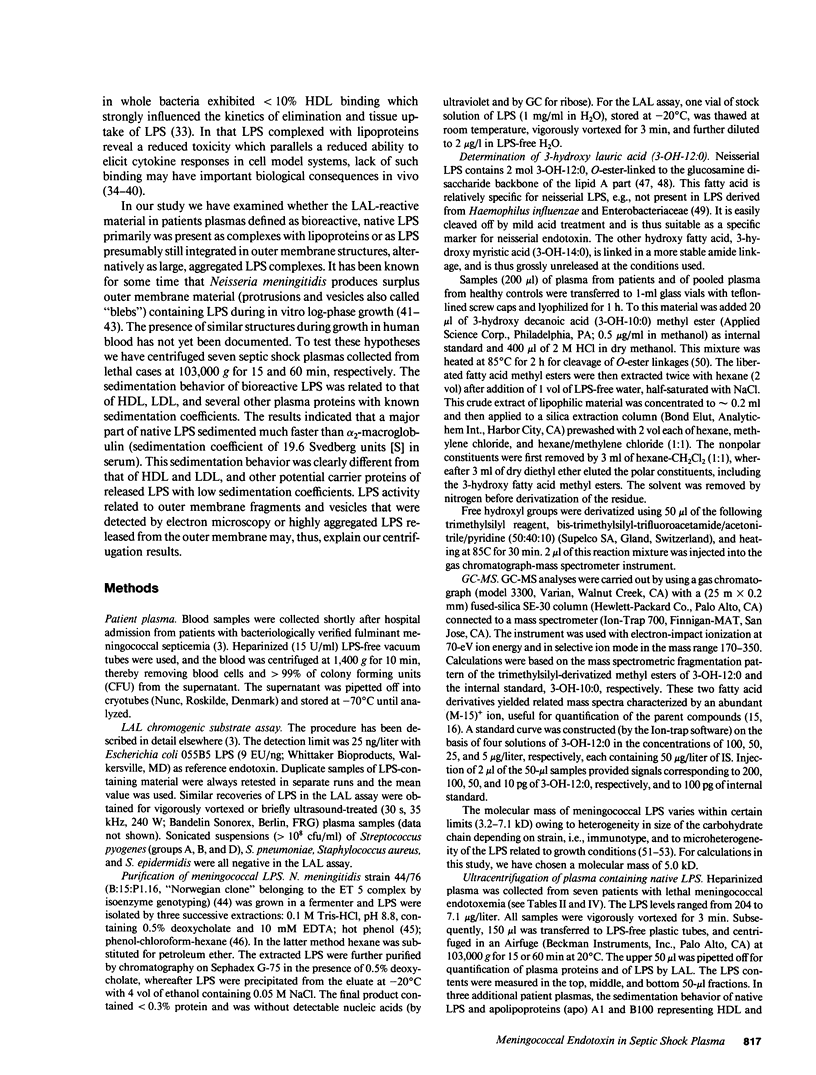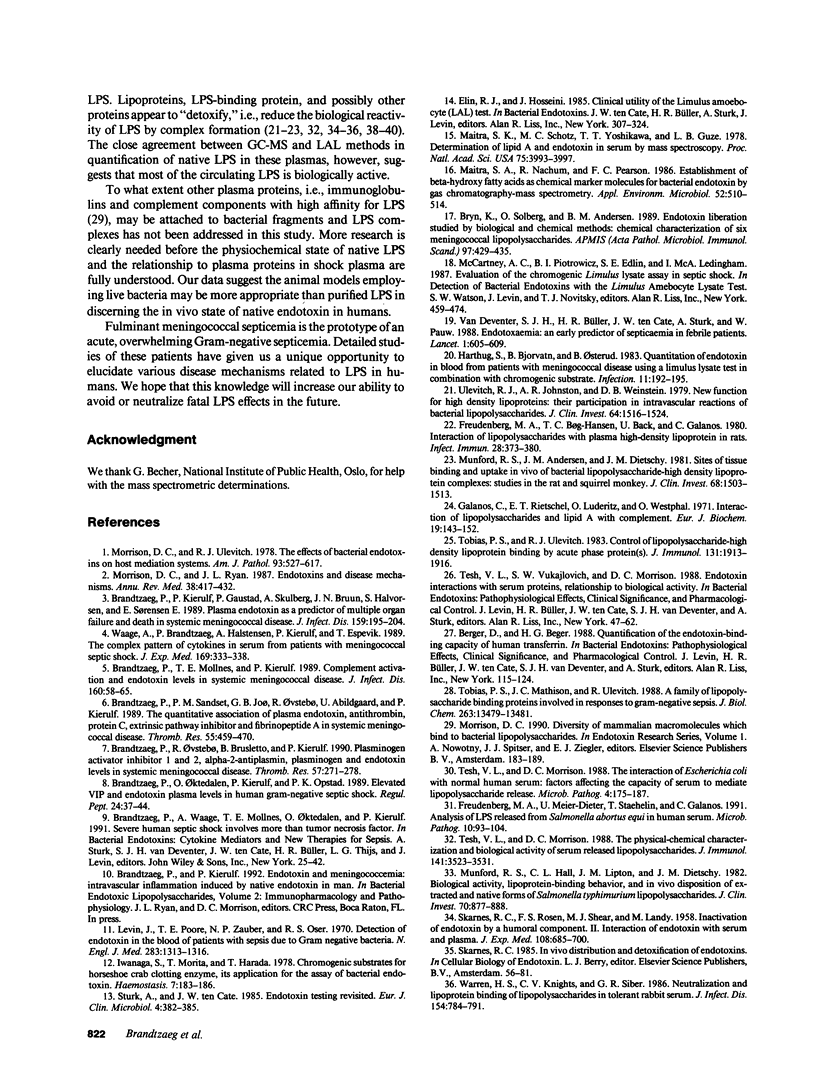Abstract
We have compared gas chromatography and mass spectrometry (GC-MS) analysis with the Limulus amebocyte lysate (LAL) assay to quantify native meningococcal lipopolysaccharides (LPS) in five patient plasmas containing greater than 5 micrograms/liter by LAL. 3-Hydroxy lauric acid (3-OH-12:0) was used as a specific lipid A marker of neisserial LPS. The quantitative LAL results were confirmed by GC-MS (r = 0.98, P = 0.006). Seven patient plasmas were centrifuged at 103,000 g and the sedimentation behavior of native LPS compared with reference plasma proteins and with apo A1 and apo B100 representing high and low density lipoproteins. After 15 min of centrifugation, 84 +/- 2% (mean +/- SE) of the recovered LPS were found in the lower one-third of the centrifuged volume, whereas 6 +/- 1% remained in the upper one-third volume, indicating that meningococcal endotoxin circulates as complexes with high sedimentation coefficients. Bacterial outer membrane fragments were detected in the bottom fractions of three patient plasmas examined by means of electron microscopy. In three patient plasmas ultracentrifuged for 60 min at 103,000 g, the levels of apo A1 and apo B100 revealed minor changes, whereas only 1 +/- 1% of the recovered LPS remained in the upper one-third and 91 +/- 2% were found in the lower one-third volume. Few bioreactive LPS appear to be complexed with high and low density lipoproteins in meningococcal septic shock plasma.
Full text
PDF







Images in this article
Selected References
These references are in PubMed. This may not be the complete list of references from this article.
- Andersen B. M., Skjørten F., Solberg O. Electron microscopical study of Neisseria meningitidis releasing various amounts of free endotoxin. Acta Pathol Microbiol Scand B. 1979 Apr;87B(2):109–115. doi: 10.1111/j.1699-0463.1979.tb02412.x. [DOI] [PubMed] [Google Scholar]
- Brandtzaeg P., Joø G. B., Brusletto B., Kierulf P. Plasminogen activator inhibitor 1 and 2, alpha-2-antiplasmin, plasminogen, and endotoxin levels in systemic meningococcal disease. Thromb Res. 1990 Jan 15;57(2):271–278. doi: 10.1016/0049-3848(90)90326-8. [DOI] [PubMed] [Google Scholar]
- Brandtzaeg P., Kierulf P., Gaustad P., Skulberg A., Bruun J. N., Halvorsen S., Sørensen E. Plasma endotoxin as a predictor of multiple organ failure and death in systemic meningococcal disease. J Infect Dis. 1989 Feb;159(2):195–204. doi: 10.1093/infdis/159.2.195. [DOI] [PubMed] [Google Scholar]
- Brandtzaeg P., Mollnes T. E., Kierulf P. Complement activation and endotoxin levels in systemic meningococcal disease. J Infect Dis. 1989 Jul;160(1):58–65. doi: 10.1093/infdis/160.1.58. [DOI] [PubMed] [Google Scholar]
- Brandtzaeg P., Oktedalen O., Kierulf P., Opstad P. K. Elevated VIP and endotoxin plasma levels in human gram-negative septic shock. Regul Pept. 1989 Jan;24(1):37–44. doi: 10.1016/0167-0115(89)90209-7. [DOI] [PubMed] [Google Scholar]
- Brandtzaeg P., Sandset P. M., Joø G. B., Ovstebø R., Abildgaard U., Kierulf P. The quantitative association of plasma endotoxin, antithrombin, protein C, extrinsic pathway inhibitor and fibrinopeptide A in systemic meningococcal disease. Thromb Res. 1989 Aug 15;55(4):459–470. doi: 10.1016/0049-3848(89)90054-6. [DOI] [PubMed] [Google Scholar]
- Bryn K., Jantzen E. Quantification of 2-keto-3-deoxyoctonate in (lipo)polysaccharides by methanolytic release, trifluoroacetylation and capillary gas chromatography. J Chromatogr. 1986 Nov 26;370(1):103–112. doi: 10.1016/s0021-9673(00)94678-8. [DOI] [PubMed] [Google Scholar]
- Bryn K., Solberg O., Andersen B. M. Endotoxin liberation studied by biological and chemical methods. Chemical characterization of six meningococcal lipopolysaccharides. APMIS. 1989 May;97(5):429–435. doi: 10.1111/j.1699-0463.1989.tb00811.x. [DOI] [PubMed] [Google Scholar]
- CLAUSS A. Gerinnungsphysiologische Schnellmethode zur Bestimmung des Fibrinogens. Acta Haematol. 1957 Apr;17(4):237–246. doi: 10.1159/000205234. [DOI] [PubMed] [Google Scholar]
- Caugant D. A., Frøholm L. O., Bøvre K., Holten E., Frasch C. E., Mocca L. F., Zollinger W. D., Selander R. K. Intercontinental spread of a genetically distinctive complex of clones of Neisseria meningitidis causing epidemic disease. Proc Natl Acad Sci U S A. 1986 Jul;83(13):4927–4931. doi: 10.1073/pnas.83.13.4927. [DOI] [PMC free article] [PubMed] [Google Scholar]
- Cavaillon J. M., Fitting C., Haeffner-Cavaillon N., Kirsch S. J., Warren H. S. Cytokine response by monocytes and macrophages to free and lipoprotein-bound lipopolysaccharide. Infect Immun. 1990 Jul;58(7):2375–2382. doi: 10.1128/iai.58.7.2375-2382.1990. [DOI] [PMC free article] [PubMed] [Google Scholar]
- Devoe I. W., Gilchrist J. E. Release of endotoxin in the form of cell wall blebs during in vitro growth of Neisseria meningitidis. J Exp Med. 1973 Nov 1;138(5):1156–1167. doi: 10.1084/jem.138.5.1156. [DOI] [PMC free article] [PubMed] [Google Scholar]
- Elin R. J., Hosseini J. Clinical utility of the Limulus amebocyte lysate (LAL) test. Prog Clin Biol Res. 1985;189:307–327. [PubMed] [Google Scholar]
- Flegel W. A., Wölpl A., Männel D. N., Northoff H. Inhibition of endotoxin-induced activation of human monocytes by human lipoproteins. Infect Immun. 1989 Jul;57(7):2237–2245. doi: 10.1128/iai.57.7.2237-2245.1989. [DOI] [PMC free article] [PubMed] [Google Scholar]
- Frederichsen P., Kierulf P. A more accurate dye-binding method for the routine determination of serum albumin. Clin Chem. 1979 Jun;25(6):1180–1180. [PubMed] [Google Scholar]
- Freudenberg M. A., Bøg-Hansen T. C., Back U., Galanos C. Interaction of lipopolysaccharides with plasma high-density lipoprotein in rats. Infect Immun. 1980 May;28(2):373–380. doi: 10.1128/iai.28.2.373-380.1980. [DOI] [PMC free article] [PubMed] [Google Scholar]
- Freudenberg M. A., Meier-Dieter U., Staehelin T., Galanos C. Analysis of LPS released from Salmonella abortus equi in human serum. Microb Pathog. 1991 Feb;10(2):93–104. doi: 10.1016/0882-4010(91)90070-q. [DOI] [PubMed] [Google Scholar]
- Froholm L. O., Jyssum K., Bovre K. Electron microscopical and cultural features of Neisseria meningitidis competence variants. Acta Pathol Microbiol Scand B Microbiol Immunol. 1973 Oct;81(5):525–537. doi: 10.1111/j.1699-0463.1973.tb02238.x. [DOI] [PubMed] [Google Scholar]
- Galanos C., Lüderitz O., Westphal O. A new method for the extraction of R lipopolysaccharides. Eur J Biochem. 1969 Jun;9(2):245–249. doi: 10.1111/j.1432-1033.1969.tb00601.x. [DOI] [PubMed] [Google Scholar]
- Galanos C., Rietschel E. T., Lüderitz O., Westphal O. Interaction of lipopolysaccharides and lipid A with complement. Eur J Biochem. 1971 Mar 1;19(1):143–152. doi: 10.1111/j.1432-1033.1971.tb01298.x. [DOI] [PubMed] [Google Scholar]
- Griffiss J. M., Schneider H., Mandrell R. E., Yamasaki R., Jarvis G. A., Kim J. J., Gibson B. W., Hamadeh R., Apicella M. A. Lipooligosaccharides: the principal glycolipids of the neisserial outer membrane. Rev Infect Dis. 1988 Jul-Aug;10 (Suppl 2):S287–S295. doi: 10.1093/cid/10.supplement_2.s287. [DOI] [PubMed] [Google Scholar]
- Harris H. W., Grunfeld C., Feingold K. R., Rapp J. H. Human very low density lipoproteins and chylomicrons can protect against endotoxin-induced death in mice. J Clin Invest. 1990 Sep;86(3):696–702. doi: 10.1172/JCI114765. [DOI] [PMC free article] [PubMed] [Google Scholar]
- Harthug S., Bjorvatn B., Osterud B. Quantitation of endotoxin in blood from patients with meningococcal disease using a limulus lysate test in combination with chromogenic substrate. Infection. 1983 Jul-Aug;11(4):192–195. doi: 10.1007/BF01641194. [DOI] [PubMed] [Google Scholar]
- Iwanaga S., Morita T., Harada T., Nakamura S., Niwa M., Takada K., Kimura T., Sakakibara S. Chromogenic substrates for horseshoe crab clotting enzyme. Its application for the assay of bacterial endotoxins. Haemostasis. 1978;7(2-3):183–188. doi: 10.1159/000214260. [DOI] [PubMed] [Google Scholar]
- Levin J., Poore T. E., Zauber N. P., Oser R. S. Detection of endotoxin in the blood of patients with sepsis due to gran-negative bacteria. N Engl J Med. 1970 Dec 10;283(24):1313–1316. doi: 10.1056/NEJM197012102832404. [DOI] [PubMed] [Google Scholar]
- Maitra S. K., Nachum R., Pearson F. C. Establishment of beta-hydroxy fatty acids as chemical marker molecules for bacterial endotoxin by gas chromatography-mass spectrometry. Appl Environ Microbiol. 1986 Sep;52(3):510–514. doi: 10.1128/aem.52.3.510-514.1986. [DOI] [PMC free article] [PubMed] [Google Scholar]
- Maitra S. K., Schotz M. C., Yoshikawa T. T., Guze L. B. Determination of lipid A and endotoxin in serum by mass spectroscopy. Proc Natl Acad Sci U S A. 1978 Aug;75(8):3993–3997. doi: 10.1073/pnas.75.8.3993. [DOI] [PMC free article] [PubMed] [Google Scholar]
- Morrison D. C., Ryan J. L. Endotoxins and disease mechanisms. Annu Rev Med. 1987;38:417–432. doi: 10.1146/annurev.me.38.020187.002221. [DOI] [PubMed] [Google Scholar]
- Morrison D. C., Ulevitch R. J. The effects of bacterial endotoxins on host mediation systems. A review. Am J Pathol. 1978 Nov;93(2):526–618. [PMC free article] [PubMed] [Google Scholar]
- Munford R. S., Andersen J. M., Dietschy J. M. Sites of tissue binding and uptake in vivo of bacterial lipopolysaccharide-high density lipoprotein complexes: studies in the rat and squirrel monkey. J Clin Invest. 1981 Dec;68(6):1503–1513. doi: 10.1172/JCI110404. [DOI] [PMC free article] [PubMed] [Google Scholar]
- Munford R. S., Hall C. L., Lipton J. M., Dietschy J. M. Biological activity, lipoprotein-binding behavior, and in vivo disposition of extracted and native forms of Salmonella typhimurium lipopolysaccharides. J Clin Invest. 1982 Oct;70(4):877–888. doi: 10.1172/JCI110684. [DOI] [PMC free article] [PubMed] [Google Scholar]
- SKARNES R. C., ROSEN F. S., SHEAR M. J., LANDY M. Inactivation of endotoxin by a humoral component. II. Interaction of endotoxin with serum and plasma. J Exp Med. 1958 Nov 1;108(5):685–699. doi: 10.1084/jem.108.5.685. [DOI] [PMC free article] [PubMed] [Google Scholar]
- Schneider H., Hale T. L., Zollinger W. D., Seid R. C., Jr, Hammack C. A., Griffiss J. M. Heterogeneity of molecular size and antigenic expression within lipooligosaccharides of individual strains of Neisseria gonorrhoeae and Neisseria meningitidis. Infect Immun. 1984 Sep;45(3):544–549. doi: 10.1128/iai.45.3.544-549.1984. [DOI] [PMC free article] [PubMed] [Google Scholar]
- Sturk A., ten Cate J. W. Endotoxin testing revisited. Eur J Clin Microbiol. 1985 Aug;4(4):382–385. doi: 10.1007/BF02148687. [DOI] [PubMed] [Google Scholar]
- Takayama K., Qureshi N., Hyver K., Honovich J., Cotter R. J., Mascagni P., Schneider H. Characterization of a structural series of lipid A obtained from the lipopolysaccharides of Neisseria gonorrhoeae. Combined laser desorption and fast atom bombardment mass spectral analysis of high performance liquid chromatography-purified dimethyl derivatives. J Biol Chem. 1986 Aug 15;261(23):10624–10631. [PubMed] [Google Scholar]
- Tesh V. L., Morrison D. C. The interaction of Escherichia coli with normal human serum: factors affecting the capacity of serum to mediate lipopolysaccharide release. Microb Pathog. 1988 Mar;4(3):175–187. doi: 10.1016/0882-4010(88)90068-x. [DOI] [PubMed] [Google Scholar]
- Tesh V. L., Morrison D. C. The physical-chemical characterization and biologic activity of serum released lipopolysaccharides. J Immunol. 1988 Nov 15;141(10):3523–3531. [PubMed] [Google Scholar]
- Tobias P. S., Mathison J. C., Ulevitch R. J. A family of lipopolysaccharide binding proteins involved in responses to gram-negative sepsis. J Biol Chem. 1988 Sep 25;263(27):13479–13481. [PubMed] [Google Scholar]
- Tobias P. S., Ulevitch R. J. Control of lipopolysaccharide-high density lipoprotein binding by acute phase protein(s). J Immunol. 1983 Oct;131(4):1913–1916. [PubMed] [Google Scholar]
- Tsai C. M., Boykins R., Frasch C. E. Heterogeneity and variation among Neisseria meningitidis lipopolysaccharides. J Bacteriol. 1983 Aug;155(2):498–504. doi: 10.1128/jb.155.2.498-504.1983. [DOI] [PMC free article] [PubMed] [Google Scholar]
- Ulevitch R. J., Johnston A. R., Weinstein D. B. New function for high density lipoproteins. Their participation in intravascular reactions of bacterial lipopolysaccharides. J Clin Invest. 1979 Nov;64(5):1516–1524. doi: 10.1172/JCI109610. [DOI] [PMC free article] [PubMed] [Google Scholar]
- Van Lenten B. J., Fogelman A. M., Haberland M. E., Edwards P. A. The role of lipoproteins and receptor-mediated endocytosis in the transport of bacterial lipopolysaccharide. Proc Natl Acad Sci U S A. 1986 Apr;83(8):2704–2708. doi: 10.1073/pnas.83.8.2704. [DOI] [PMC free article] [PubMed] [Google Scholar]
- Waage A., Brandtzaeg P., Halstensen A., Kierulf P., Espevik T. The complex pattern of cytokines in serum from patients with meningococcal septic shock. Association between interleukin 6, interleukin 1, and fatal outcome. J Exp Med. 1989 Jan 1;169(1):333–338. doi: 10.1084/jem.169.1.333. [DOI] [PMC free article] [PubMed] [Google Scholar]
- Warren H. S., Knights C. V., Siber G. R. Neutralization and lipoprotein binding of lipopolysaccharides in tolerant rabbit serum. J Infect Dis. 1986 Nov;154(5):784–791. doi: 10.1093/infdis/154.5.784. [DOI] [PubMed] [Google Scholar]
- van Deventer S. J., Buller H. R., ten Cate J. W., Sturk A., Pauw W. Endotoxaemia: an early predictor of septicaemia in febrile patients. Lancet. 1988 Mar 19;1(8586):605–609. doi: 10.1016/s0140-6736(88)91412-2. [DOI] [PubMed] [Google Scholar]




